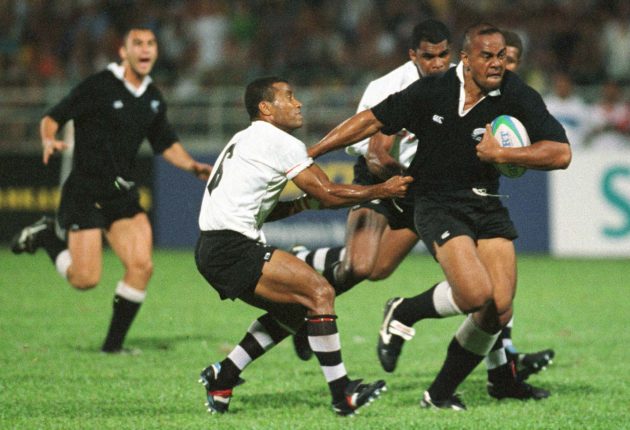The legendary New Zealand winger made his mark at the first tournament in Kuala Lumpur
Jonah Lomu at the Commonwealth Games
For a sport seeking to demonstrate what it could bring to the Commonwealth Games, Jonah Lomu was the ideal figurehead.
The New Zealand winger had been rugby’s most recognisable player since bulldozing onto the scene as a 20-year-old at the 1995 Rugby World Cup and the year before at the Hong Kong Sevens. So it made total sense he would be selected for the first Commonwealth Games sevens tournament in 1998.
A quick glance at his statistics in 1998 suggests Lomu was not in the all-conquering form that saw him notch four tries against England on that famous afternoon in Cape Town. He had scored just two tries in his previous 12 All Blacks appearances when he left for the Games in Kuala Lumpur and had taken time out of the sport after being diagnosed with a kidney disorder in 1996. Still, this was Jonah Lomu. This was the winger who shrugged off grown men like they were children. This was the player who had his own video game. There could not have been a better draw for the casual fan.
And sure enough, he dominated as New Zealand won gold in the Malaysian capital. In the group stages, Malaysia, Sri Lanka and the Bahamas were beaten by a combined score of 226-0, before Tonga were swept aside.

Lomu makes a break against Tonga (Getty Images)
New Zealand met Wales in the last eight, where Lomu scored three second-half tries in another routine win.
The hat-trick displayed Lomu’s unique set of skills. For his first score, he received the ball behind his own 10m line, broke free with a brutal hand-off and then made Gareth Cooper look foolish with a piece of nifty footwork.
The second was jaw-dropping due to its effortless nature – one hitch-kick, a touch of acceleration and an unopposed finish in the corner.
New Zealand were given a scare by Samoa in the semi-finals before prevailing 19-14 to set up a game against Fiji for the gold medal.
Could the mighty Fijians, boasting sevens magician Waisale Serevi and its own set of imposing physical specimens, prove Lomu was a mere mortal? Of course not. Lomu made his presence known early with a monster fend to send a Fijian defender to the turf.
He then turned provider, setting up tries for Dallas Seymour and Christian Cullen to give New Zealand a 14-7 lead at half-time.
As if desperate to prove he was more than a finisher, Lomu’s most crucial play of the final came in defence, as he made a spectacular try-saving tackle on Rokini Saimoni to preserve his country’s lead.
A try from Caleb Ralph sealed gold, and it should be emphasised that this New Zealand side, featuring the likes of Ralph, Cullen and Rico Gear, were far from a one-man show.

Lomu celebrates after winning gold (Getty Images)
Nevertheless, this was the tournament of Lomu. He became the poster boy of the event and ensured that sevens would be part of the Commonwealth Games for years to come.
The end of Lomu’s time in the famous black jersey would come far sooner than his performances suggested. There would be more memorable moments in the future, such as his eight tries at the 1999 Rugby World Cup or his last-minute score in the incredible Bledisloe Cup opener of 2000, but his international career was over by 2002.
Still, he undoubtedly left a rich legacy in a relatively brief period at the top. His performances in Kuala Lumpur, which highlighted sevens’ value at multi-sport events and helped it eventually earn Olympic status, ranks among his most significant achievements.
Download the digital edition of Rugby World straight to your tablet or subscribe to the print edition to get the magazine delivered to your door.
Follow Rugby World on Facebook, Instagram and Twitter.





